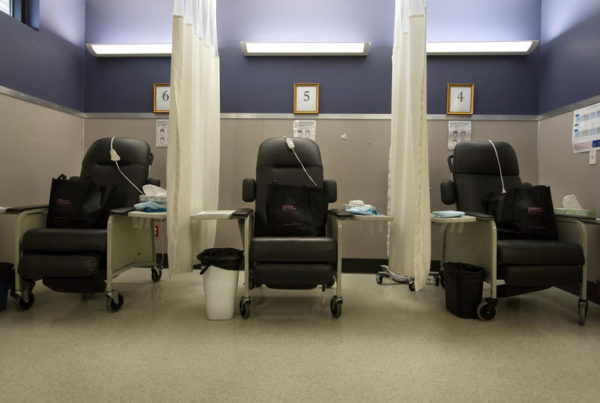As Senate republican leaders prepare to reveal another version of their plan to repeal and/or replace the Affordable Care Act, taking politics out of the health care picture may be just the medicine needed. Political noise aside, the fact remains that health care costs are still too high and many individuals can’t afford the coverage they need. Experts say the political debate is essentially moot until the financial barriers to care are sorted out.
Texas Standard Host David Brown asked four experts who understand medicine – and where the money goes – to give their prescriptions for reducing health care costs.
The pharmaceutical pricing system is broken
The U.S government has set up an untenable system for regulating the pharmaceutical industry, says Seth Chandler, professor and co-director of the University of Houston’s Health Law and Policy Institute.
On problematic pharmaceutical regulation:
We’ve got laws that basically prohibit pharmaceutical manufacturers from offering low prices to individuals. We’ve got regimes where consumers can’t buy drugs from other countries, and so a source of competition is eliminated. We’ve just got a large, government-created problem here, which is resulting in a $400 billion a year spending on pharmaceuticals that’s growing at 10 percent a year.
On the possibility of price negotiations affecting research and development of new drugs:
There is some remote possibility that some drug somewhere might not be developed if pharmaceutical manufacturers couldn’t gauge the government. However, there are drugs right now that people aren’t getting because they can’t afford them…
Americans pay more for lower-quality care
Texas Tech University Health Sciences Center of El Paso President Dr. Richard Lange says research needs to be done on the cost-effectiveness of American health care.
On looking at other countries for inspiration:
The United Kingdom has what’s known as the National Institute for Health and Care Excellence. …They do a cost-effective analysis for any therapy. So, they’re not using imaging that’s not successful, they’re not using more expensive drugs that don’t enhance the quality and quantity of life, they’re not recommending therapies that don’t make people either feel better or live longer.
On the ethical issues of allowing a committee to decide which therapies are covered:
A commission like this would be able to make recommendations in the public interest that are science based and nonpartisan.
Patients are in the dark about health care service prices
Vivian Ho, director of the Center for Health and Biosciences at Rice University’s Baker Institute for Public Policy, says health care providers should be required to be more transparent about pricing.
On requiring freestanding emergency rooms to post their prices:
I think it would be helpful if the legislature…[would] require these freestanding emergency departments to report and post the prices they pay when you walk through the door.
On emergency rooms versus urgent care:
An urgent care center does not charge a facility fee so you know you’re gonna be paying a lower price. …Very often you can be treated for the same conditions.
Employer health insurance should be taxed
Michael Morrisey, head of the health policy and management department at the Texas A&M School of Public Health, says shifting some of the financial burden onto employees by taxing employer-provided health insurance would encourage people to be more careful about the health care services they use.
On trading generous employer health-care coverage for higher wages:
With the elimination of the special tax treatment, that would encourage we as workers to say What we’d like to have now is more money wages, somewhat less generous health insurance. So we would have coverage that has a bigger deductible or maybe it has a $50 copay.
On the gamble that employers would increase wages if health insurance costs go down:
Employers have to pay workers what they’re worth or they tend to go to work for somebody else. And that suggests that market forces would drive money wages up even as it reduced the generosity of the health insurance plans.
Written by Caroline Covington.















